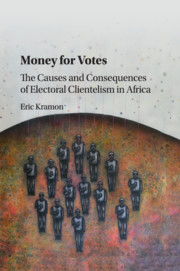Book contents
- Frontmatter
- Contents
- List of Tables
- List of Figures
- Acknowledgments
- Part I The Puzzle of Electoral Clientelism
- Part II Empirical Evidence
- Appendices
- A Survey List Experiment Details
- B Variables from the Afrobarometer Survey Data
- C Field Experiment Radio Recording Script
- D Description of Control Variables in the Field Experiment
- E The Sample and Balance in the Field Experiments
- F Supplementary Results for Chapter 5
- G Supplementary Results for Chapter 7
- Bibliography
- Index
F Supplementary Results for Chapter 5
from Appendices
Published online by Cambridge University Press: 26 October 2017
- Frontmatter
- Contents
- List of Tables
- List of Figures
- Acknowledgments
- Part I The Puzzle of Electoral Clientelism
- Part II Empirical Evidence
- Appendices
- A Survey List Experiment Details
- B Variables from the Afrobarometer Survey Data
- C Field Experiment Radio Recording Script
- D Description of Control Variables in the Field Experiment
- E The Sample and Balance in the Field Experiments
- F Supplementary Results for Chapter 5
- G Supplementary Results for Chapter 7
- Bibliography
- Index
Summary
F.0.1 Prospective Expectations: Results on Individual Survey Items
Figure 5.3 presents results of experimental analyses in which the dependent variable is a mean index capturing participants’ prospective expectations of the candidates presented in the field experiment. This section presents the results on each of the individual items that make up the index.
F.0.2 Norms of Reciprocity Tests
This section presents the measures and results used to address the social norms of reciprocity alternative explanation. I first describe the measures and then present the results.
I measure positive reciprocity, which captures the degree to which someone is willing to incur costs to pay back those who have helped them, and negative reciprocity, which captures the degree to which someone is willing to incur costs to seek revenge against someone who has wronged them. To capture positive reciprocity, I measure the degree of agreement (on a 5-point scale) with the statements: (1) “If someone does me a favor, I am prepared to return it,” and (2) “I will go out of my way to help somebody who has been kind to me before.” To measure negative reciprocity, I assess participants’ degree of agreement with the following statements: (1) “If somebody insults me, I will insult him or her back,” and (2) “If somebody puts me in a difficult position I will do the same to him or her.” I average the two responses in each category to get measures of positive and negative reciprocity, and average those two scores to produce a measure of average reciprocity. I present results using all three measures— average, positive, and negative—in part because positive and negative reciprocity are weakly correlated (r = −0.1) and because they may capture different traits (Dohmen et al., 2009). These measures are admittedly less precise than behavioral measures, such as those used in Finan and Schechter (2012). This is in part because they are prone to response bias and in part because the questions are open to interpretation and therefore provide a less uniform decision-making environment. However, they are widely used survey-based measures of positive and negative reciprocity.
The results are presented below. Columns 1, 3, and 5 present the interaction between treatment and each of the individual reciprocity measures in models without control variables.
- Type
- Chapter
- Information
- Money for VotesThe Causes and Consequences of Electoral Clientelism in Africa, pp. 207 - 210Publisher: Cambridge University PressPrint publication year: 2017



